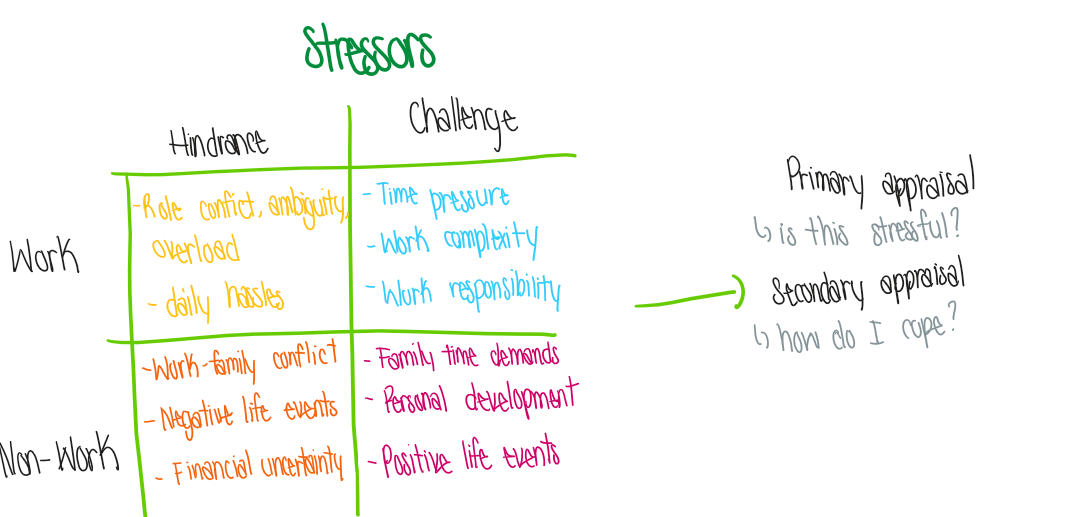Chapter 6: Stress & Wellbeing
1/30
There's no tags or description
Looks like no tags are added yet.
Name | Mastery | Learn | Test | Matching | Spaced |
|---|
No study sessions yet.
31 Terms
What is the stress process?
Begins with stressors
→ causes stress
→ causes strains
What are stressors, stress, & strains??
Stressors: Demands that cause stress
Stress: Psychological response to demands that tax/exceed one’s capacity
Strains: The outcome/consequences of stress
the reaction to stress
What are strains?
The outcome/consequences of stress
the reaction to stress
What is the transactional theory of stress?
Things experienced at work & out of work that cause stress!
Hindrance stressors in work & out of work
Challenge stressors in work & out of work

What are hindrance stressors? (at work & non-work)
These stressors are debilitating
hinder goals
Work:
role conflict, role ambiguity, role overload, daily hassles
Non-work
work-family conflict, negative life events, financial uncertainty
What are challenge stressors? (at work & non-work)
Stressors that are positive
energizing/motivating to help achieve goals
Work:
time pressure, work complexity, work responsibility
Non-work:
family-time demands, personal development, positive life events
What is primary & secondary appraisal?
Primary: is this stressful?
Secondary: how do I cope?
What is role conflict?
Conflicting demands/expectations
ex. evaluation on how quick you take calls & on customer satisfaction
What is role ambiguity?
Unclear expectations
ex. starting a new job with no training
What is role overload?
Too many responsibilities/demands
What are daily hassles?
Daily minor hindrances that add up
lead to stress
ex. losing wifi every hour
What is interpersonal conflict?
Difficult co-workers
Harassment/bullying
What are working conditions?
physical/environmental
psychological/procedural
What is work-family conflict?
When pressures of work and pressures of home conflict
What are negative life events?
Anything negative that happens in your life that impacts work
ex. divorce, death of relative
What is financial uncertainty?
Lack of financial security for future
anything financial outside of work
ex. partner loses job
What is time pressure?
Deadlines that pushes you into doing work
What is work complexity?
Work that requires skills
problem solving, new type of work
What is work responsibility?
Being reliable/accountable for tasks at work
What are family-time demands?
Expectations on family time that can strain balancing work
What is personal development?
Tasks/demands that allow opportunity for self growth
What are positive life events?
Positive changes that cause stress but seen as beneficial
ex. marriage, new job
What are psychological strains?
Caused by stress:
Anger, anxiety, frustration, depression, job dissatisfaction, reduced affective commitment, difficult concentrating
What do strains lead to?
Burnout
Causes: emotional, mental, physical exhaustion
Leads to: cynicism, low self-efficacy
What are physical strains?
Physical reactions to stress
dizziness, headaches, tight muscles, pounding heart, stomach distress, difficulty sleeping, short of breath, illness, death
What are behavioural strains?
Behavioural reactions to stress
accidents at work, performance changes (lack of concentration)
substance abuse, absenteeism, turnover, aggression, counterproductive work behaviours
What are behaviour methods to coping with stressors?
Acting differently
Problem focused:
working harder, seek assistance, get more resources
Emotion focused:
engage in other activities, seek support, vent anger
What are cognitive methods to coping with stressors?
Thinking differently
Problem focused:
strategizing, self-motivation, change priorities
Emotion focused:
avoid, distance, ignore; look for positive in negative; reappraising what’s important
How can you reduce & manage stress?
Work planning:
Decrease/compress work-week
flextime, flexplace (work from home)
personal days/hours
job sharing
part-time work
Health & wellness programs
Work training:
knowledge, skills, interactions (civility)
What is the role of personality in stress?
Personality differences can vary how people perceive stressors
ex. type A will have more intense/heightened reactions to stress
What is social support?
Seeking help to mitigate/dampen stressor or your reaction to stress
instrumental & emotional
more effective if received from workplace